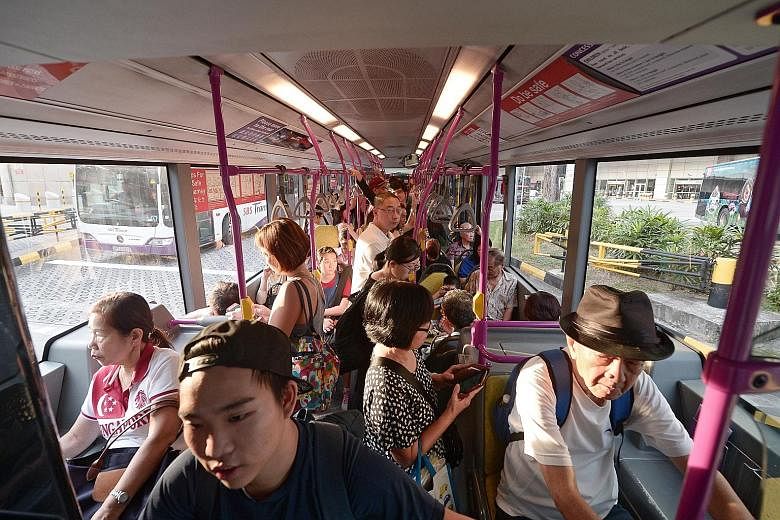Industry players and investors welcome the switch from the current regime to the new bus contracting model, while commuters are waiting to see whether it will lead to better service.
Commenting on the agreement to move over to the new model - where the Government owns operating assets and assumes revenue risks, and operators are paid a fee to run services - SBS Transit chief executive Gan Juay Kiat said: "We are glad that we have been able to successfully conclude the terms of the negotiated contract with the Land Transport Authority (LTA).
"While this bus contracting model is a more sustainable model for the long term, commuters can also expect higher service levels as bus services will progressively come under the contract's bus service reliability framework. This means better regularity of buses calling at bus stops."
In its first-quarter financial results briefing on Monday, SMRT noted that the new model "has safeguards against inflation, wage and energy cost increases".
SMRT added that it will also take part in the competitive bid for the next tender package in Seletar.
Yesterday, the LTA said it had concluded a deal to move both SBS Transit and SMRT Buses over to the new contracting model.

It expects to pay the two around $7.2 billion to run 11 route packages with tenures ranging from two to 10 years. The payments will be made in annual instalments.
Maybank Kim Eng analyst Derrick Heng said the new model will be positive for the two companies.
"But if shareholders expect a huge windfall in the form of special dividends, they will be disappointed," he said. "But in the long term, it will be a more positive model as it frees the operators from revenue risks."
Mr Heng estimates SBS Transit will have an annual revenue of $760 million and SMRT will have $311 million, based on an assumed seven- and six-year average tenure respectively. At the same time, they get to keep advertising and rental revenue arising from their bus businesses.
DBS Equity Research senior vice-president Andy Sim said the move should augur well for the two companies, whose bus operations "are running at low profitability".
"The variability of the tenures is interesting... Looking at the tenures of the contracts, there are only three out of 11 which are five years and under," he noted, adding that this should provide longer-term predictability for the two incumbents.
Investors clearly view the new model in a positive light. On May 20, 2014, SMRT and ComfortDelGro shares spiked on speculation that the Government would assume ownership of all buses and depots, and that transport firms would bid for routes to operate in competitive tenders.
SIM University economist Walter Theseira said the $7.2 billion fee would have taken into account the two recent successful route tenders by Tower Transit and Go-Ahead.
As to whether it represented fair value, he said that depended on the fare revenue the LTA would eventually collect.
"But given public demand for a high level of service and quality together with low fares, I think it is quite possible the Government will end up effectively subsidising the public bus system," Dr Theseira said.
"Certainly, the Government has already done so through programmes such as the Bus Service Enhancement Programme, to say nothing of the infrastructure cost of building bus depots and other bus infrastructure. However, we will need to evaluate the system after launch to assess this frankly."
SIM University senior lecturer Park Byung Joon said "increased service frequency and less bus bunching" are two requirements clearly spelt out in the new bus contracts. He said incentives and penalties are also in place to motivate operators to keep to these standards.


